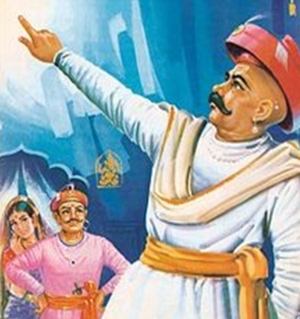Talk:Rāma Śāstrī (18th century CE)
By Vishal Agarwal
Many ṛṣis like Manu, Bṛhaspati and Nārada wrote books called the Dharmashāstras. A large portion of these books dealt with how disputes between people over various issues (e.g., possession of land or gold, non-repayment of loans, theft) should be solved in courts.
In fact, modern scholars sometimes say that the dharmaśāstra especially those of Ṛṣi Nārada are as sophisticated and complicated as modern books on this topic, even though they were written thousands of years ago. The vedic society deeply valued justice and wanted to ensure that the strong did not harass the weaker people in society.
One can earn a substantial amount of money by pursuing a career as an attorney, lawyer, or court judge. Unfortunately, many attorneys choose to defend extremely evil but rich criminals so that they can make a lot of money. However, the Dharmashāstras teach us that the true purpose of being a lawyer or a judge is not to make money, but to ensure that people get justice according to Dharm.
The Story of Judge Rām Śāstrī
Rām Śāstrī was the chief judge at the royal court of the Peshvā (the title of the ruler of the Marāṭhā Empire), who ruled a large part of India in the second half of the 18th century CE from the city of Pune in western India.
He was very learned in the Vedas and other Śāstras. He lived a very simple and frugal life, following the teachings of Śāstra that a Brāhmaṇa must not live lavishly.
One day, his wife visited the Queen in her palace. Seeing her soiled clothes, the Queen gifted her expensive clothing and jewelry. When Rām Śāstrī saw his wife return home wearing those gifts in a palanquin, he immediately shut the door on her and said:
- “It looks like a Queen has accidentally come to a poor Brāhmaṇa’s home.”
His wife understood her husband’s intent. She returned to the palace and changed back into her old clothes. This time, when she walked back to their home, she found the door already open. When she entered, Rām Śāstrī told her:
- “A Brāhmaṇa’s wife must also live very simply. Otherwise, we will lose our real treasure, which is humility.”
Some time later, the Peshvā died, and his young son was murdered by his uncle Rāghobā. Rām Śāstrī was asked to adjudicate the case and serve as judge in the trial of Rāghobā.
Rāghobā and his wife were a very powerful couple in the Marāṭhā Empire. They offered riches to Rām Śāstrī if he declared them innocent. When he refused, they threatened to have him killed.
Still, Rām Śāstrī did not budge. He courageously declared that Rāghobā was guilty of murdering his own nephew.
Due to political complications, Rāghobā was spared from punishment and was appointed the next King. Rām Śāstrī then resigned and retired to his native village.
He preferred to live the rest of his life in isolation and poverty rather than give up his principles of truth, honesty, and simple living.

